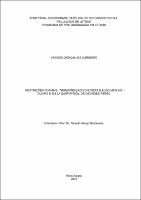| Share record |


|
Please use this identifier to cite or link to this item:
https://tede2.pucrs.br/tede2/handle/tede/6591Full metadata record
| DC Field | Value | Language |
|---|---|---|
| dc.creator | Carneiro, Vinícius Gonçalves | - |
| dc.creator.Lattes | http://buscatextual.cnpq.br/buscatextual/visualizacv.do?id=K4423874D8 | por |
| dc.contributor.advisor1 | Barberena, Ricardo Araujo | - |
| dc.contributor.advisor1Lattes | http://buscatextual.cnpq.br/buscatextual/visualizacv.do?id=K4760734P5 | por |
| dc.date.accessioned | 2016-04-14T14:19:29Z | - |
| dc.date.issued | 2015-01-09 | - |
| dc.identifier.uri | http://tede2.pucrs.br/tede2/handle/tede/6591 | - |
| dc.description.resumo | O grupo literário Oulipo (Ouvroir de littérature potentielle [Ateliê de Literatura Potencial]) surgiu na década de 1960, na França, e postulava, a partir da aproximação entre literatura e matemática, a utilização de contraintes para a criação literária e para os estudos sobre literatura. Conforme o Oulipo, que tinha entre seus integrantes Raymond Queneau, Italo Calvino, Jacques Roubaud e Georges Perec, toda a obra literária possui restrições formais, cabendo ao escritor ter consciência desse processo. Um dos romances que tornaram o grupo famoso foi La disparition, de 1969, escrito sem a vogal “e”, a mais utilizada em francês. Nessa obra, a restrição está intimamente ligada a um jogo metatextual, em que se alude constantemente à ausência da vogal. Partindo da hipótese de que nem um autor, grupo ou movimento literário tem controle sobre os sentidos ou interpretações dos textos a ele ligados, este estudo se propõe a debater os postulados oulipianos, sobretudo o conceito de contrainte, e suas consequências nos estudos literários. Além disso, apresenta-se uma análise da obra de Georges Perec, com destaque para o romance La disparition (2009a [1969]). Para efetivar tal análise, propõe-se também a tradução de extratos do livro, sendo a tradução aqui entendida como crítica (CAMPOS, 2004). A discussão teórica partirá de alguns conceitos da teoria literária, como os de morte do autor de Roland Barthes (2004), de intertextualidade de Julia Kristeva (2005), de metatextual de Bernard Magné (1986; 1989), de leitor de Wolfgang Iser (1996; 1999) e Umberto Eco (1991) e de jogo de Huizinga (2012) e Agamben (2007), dentre outros. | por |
| dc.description.abstract | The Oulipo (Ouvroir de littérature potentielle [Workshop of Potential Literature]) is a post-World War literary movement founded by mathematicians and writers amongst whom we find famous personalities such as Raymond Queneau, Italo Calvino, Georges Perec and Jacques Roubaud. The Oulipo is based on the formal constraint as a "machine" of artistic creation in two ways: on the one side, an analytical approach which studies "plagiats par anticipation [anticipatory plagiarism]", i.e., the writers who worked on the formal constraints before the Oulipo; on the other hand, a synthetic approach based on innovation and experimentation with new literary constraints. Firstly, this doctoral dissertation discusses concepts (implicitly or explicitly) presented in the manifestos of the group and in the critical texts and interviews with Georges Perec, concerning mainly the concept of constraint. Secondly, it discusses these notions in the work of Perec, including the lipogram novel La disparition (2009a [1969]). The heart of this part is to analyze the relationship between the discourse of the Oulipo and its immediate and visible effects in La disparition, therefore between constraint and aesthetic formalism. As theoretical basis, the concepts of metatextuality as proposed by Bernard Magné (1986; 1989), the death of the author as proposed by Roland Barthes (2004), intertextuality as proposed by Kristeva (2005) and reader as proposed by Wolfgang Iser (1996; 1999) and Umberto Eco (1991) are essentials, among others. At the end, extracts of La disparition translated into Portuguese by the author are presented, based on the theoretical work of Haroldo de Campos (2004), which considers translation as a device of critical appropriation. | eng |
| dc.description.provenance | Submitted by Setor de Tratamento da Informação - BC/PUCRS ([email protected]) on 2016-04-14T14:19:29Z No. of bitstreams: 1 TES_VINICIUS_GONCALVES_CARNEIRO_PARCIAL.pdf: 1785022 bytes, checksum: d03a666af7b53f5454406d7c560f182e (MD5) | eng |
| dc.description.provenance | Made available in DSpace on 2016-04-14T14:19:29Z (GMT). No. of bitstreams: 1 TES_VINICIUS_GONCALVES_CARNEIRO_PARCIAL.pdf: 1785022 bytes, checksum: d03a666af7b53f5454406d7c560f182e (MD5) Previous issue date: 2015-01-09 | eng |
| dc.description.sponsorship | Coordenação de Aperfeiçoamento de Pessoal de Nível Superior - CAPES | por |
| dc.format | application/pdf | * |
| dc.thumbnail.url | http://tede2.pucrs.br:80/tede2/retrieve/164511/TES_VINICIUS_GONCALVES_CARNEIRO_PARCIAL.pdf.jpg | * |
| dc.language | por | por |
| dc.publisher | Pontifícia Universidade Católica do Rio Grande do Sul | por |
| dc.publisher.department | Faculdade de Letras | por |
| dc.publisher.country | Brasil | por |
| dc.publisher.initials | PUCRS | por |
| dc.publisher.program | Programa de Pós-Graduação em Letras | por |
| dc.rights | Acesso Aberto | por |
| dc.subject | CRÍTICA LITERÁRIA | por |
| dc.subject | PEREC, GEORGES - CRÍTICA E INTERPRETAÇÃO | por |
| dc.subject | LIPOGRAMAS | por |
| dc.subject | LITERATURA | por |
| dc.subject.cnpq | LINGUISTICA, LETRAS E ARTES::LETRAS | por |
| dc.title | Restrições formais, transcriação concreta e algo mais no Oulipo e em La Disparition, de Georges Perec | por |
| dc.type | Tese | por |
| Appears in Collections: | Programa de Pós-Graduação em Letras | |
Files in This Item:
| File | Description | Size | Format | |
|---|---|---|---|---|
| TES_VINICIUS_GONCALVES_CARNEIRO_PARCIAL.pdf | Texto Parcial | 1.74 MB | Adobe PDF |  Download/Open Preview |
Items in DSpace are protected by copyright, with all rights reserved, unless otherwise indicated.




